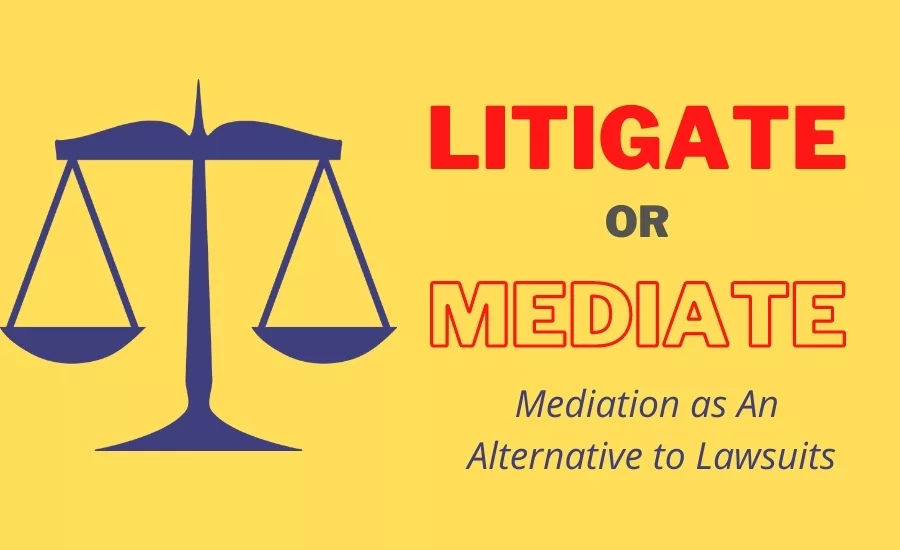Litigate or Mediate: Mediation as An Alternative to Lawsuits

If you could describe mediation briefly, it would probably be, the fine art of avoiding lawsuits.
There are hundreds of reasons why you should pick mediation instead of initiating a lawsuit – and we’re going to go through all of them together. But before, let me give you a more thorough definition of what mediation means.
What does ‘Mediation’ actually mean?
In simpler terms, mediation equals dispute resolution. If two parties are contradicting each other, a mediator would come in to solve the problem amicably. This person serves as a third, non-biased party, and ultimately negotiates the conflict. A mediator must listen carefully to what he or she is presented with and try to find a solution to the problem at hand.
How can you become a Mediator?
To pursue the mediation track, you must complete mediation training, which can be a lengthy process. Two of the best training schools are the Mediation Training Institute and the National Conflict Resolution Center. If you want to take the private route, you can pick this option. However, the program cost will probably be pricier.
After you’ve completed the training program, it’s time to get your mediation certification. Here, you must actively participate in mediation sessions and learn from your superiors. The essay writing service in the legal domain are mediators by profession, so you can consult with them too. You must assist someone for about a year before you can work independently, so reaching out to these services could be an option.
What qualities does a Mediator have?
No one is born a mediator – if you want to be successful at your job, you’ll have to develop specific characteristics. So… which ones?
- Trustworthiness. As a mediator, you must inspire trust to guide the conflicting parties. You should also act as an authority figure and have power over the conversation.
- Ethics. You cannot be a good mediator without being ethical. You cannot cross boundaries and go overboard with personal matters. There is a professional line that should be kept untouched.
- Humbleness. Being self-aware and also understanding is critical for any mediator. Without awareness of your own issues, you won’t be able to help others understand theirs.
- Non-judgmental behavior. You must act as a judge, but you should not judge the people. You should judge the facts. So, don’t be biased.
- Empathy and patience. As a mediator, you must put yourself in your clients’ shoes. Without the right amount of patience and empathy, you won’t strive.
- Rational thinking. However, you should not let yourself be guided by your emotions. Critical thinking is essential to solving the issue at hand, so make sure you stay emotionally neutral.
Mediation vs Litigation
Time is money – and both of these resources are extremely important. Litigation takes away a wide range of resources from both parties. Meditation is the middle ground, the safe space where no one gets hurt. By pursuing mediation instead of a trial, you can save up both time and money.
If you choose mediation before taking the legal route, you’ll have the chance to expose your opinion to a neutral party. And you won’t have to spend money on litigation with the risk of losing. In fact, telling your story to the mediator might help you settle much easier; and your conflicting party might feel the same. Litigation is super-expensive in comparison to mediation. Mediation costs are low – so why not try this route before anything else?
Do you have to mediate?
It really depends on where you’re located. Some courts might make you mediate while others might not. In any case, court cases can take long to process, so mediation is still more efficient at the end of the day. You’ll solve your legal problems quicker if you take this route, and you’ll avoid the costly litigation process which can take up to four or five years.
How can someone start a meditation process?
First, figure out what the problem is, and which two parties are involved. Is it business to business or person to business? Is it person to person?
Second, ask a mediator to check out your case. Check to see if they possess all the important qualities presented above – are they neutral, non-judgmental, humble, empathic, etc.?
Third, select your mediator based on their expertise. Are they specialized in business practices or family law? What exactly do you need?
Fourth, go in and solve the issue at hand in a timely manner.
What if mediation doesn’t work for me?
If mediation doesn’t work, you can also take the legal route. Know that in the U.S., mediators cannot be forced to testify. Your conversation is strictly confidential, so you have absolutely nothing to worry about.
How can I engage in a successful mediation session?
If you’re the mediator, get your certification and develop the intrinsic qualities presented above. If you’re the client, trust the mediator and openly try to reach a settlement. Work with your mediators, as they’ll also work with you – and for you. Avoid spending time and money on litigation. Save those resources for other activities.
Looking for a reprint of this article?
From high-res PDFs to custom plaques, order your copy today!





